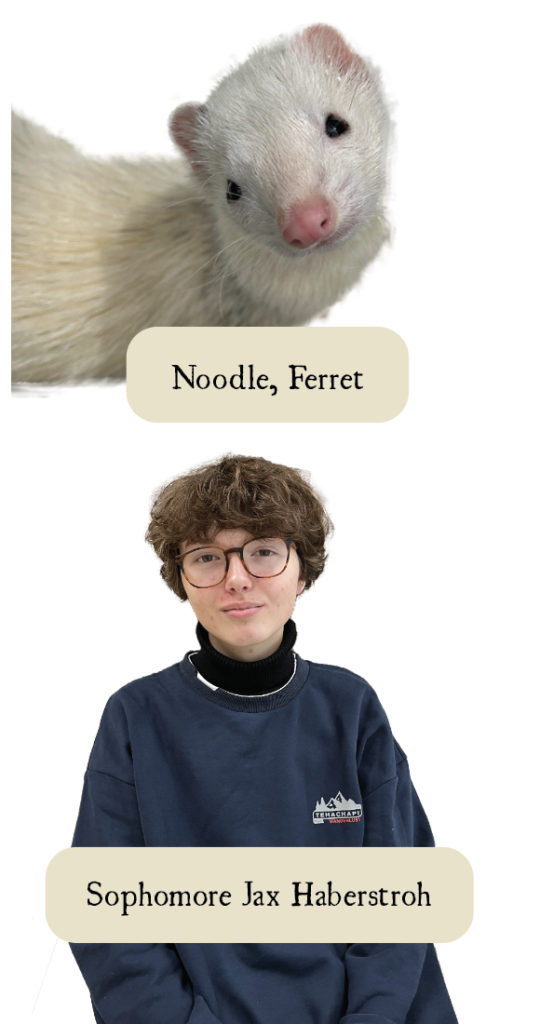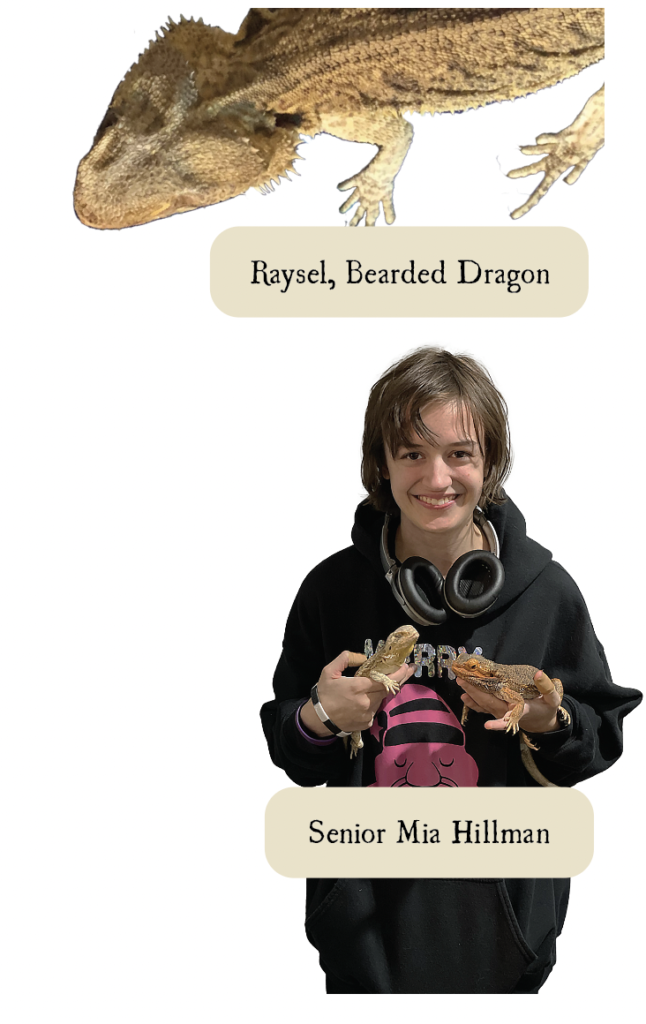Unconventional Critters: Students comfortable breaking stigma around owning unusual pets
Josie Lorenz | The Chronicle
Beyond the scales, scruff and stigma, Mason High School (MHS) students are embracing unique pets.

Sophomore Jax Haberstroh adopted 2 ferrets in 2019: Noodle and Zim. In the process of adopting them, Haberstroh conducted in-depth research to care for them to the best of his ability, wanting to have a furry friend. Noodle has Waardenburg syndrome, a syndrome that affects his social skills and reaction time, which causes him to be deaf. Though it doesn’t affect Haberstroh’s ability to care for him, he must be extra attentive.
Haberstroh said that guests are often wary of his ferrets. They worry that the animals may be aggressive or hold a strong scent. Ferrets are not fully domesticated animals and are not easily trained or fond of staying indoors, which has created a negative stigma around them.
“When bringing someone new over to see my ferrets, there are usually always two outcomes,” Haberstroh said. “Number one: they’re perfectly fine with the ferrets, or number two: they get scared, call them ‘gross’, ‘creepy’, etc.”
While these misconceptions may seem harmless to some, Haberstroh said it can mean life or death to the animals. The stigma surrounding unique pets can put off people from embracing them, leaving them in shelters or with breeders that euthanize them if they fail to be adopted.
“It’s quite harmful putting such harsh stereotypes onto animals,” Haberstroh said. “It stops animals from getting homes and families that they are in need of.”
Haberstroh said that his weasels have wiggled their way into his heart over the past couple of years and he has nothing but love for them.
“Noodle is so sweet,” Haberstroh said. “He likes to snuggle up in my sweatshirt and sleep there for hours. He’s a softy. Zim is a little antisocial but it’s not like he would bite anyone. He loves everyone.”

Senior Mia Hillman has 22 pets ranging from fish to tarantulas. One of these pets is a four-year-old bearded dragon named Raysel. Hillman said that she sees Raysel as no different than any other pet with her sassy personality and cute moments, but knows that having a unique animal has its own differences and advocates for in-depth research before adoption.
“They require a lot more than you would typically expect,” Hillman said. “[Animals] like fish and reptiles need very specific environments to be replicated in order to live a long and happy life. Bearded dragons need a dry and hot environment. Dogs and cats don’t need any of this.”
Hillman has noticed a heavy stigma around the cleanliness of her bearded dragon. There is a myth that these creatures carry diseases even though with proper care they will not.
“Bearded dragons like having human interaction,” Hillman said. “They enjoy snuggling and getting out of their cages. A lot of people don’t get them out of their cages for enrichment though, due to thinking they carry salmonella.”
Many household reptiles end up dying of insufficient attendance to their needs. She said that she wishes that people would go out of their way to see beyond the scales and learn to properly take care of them.
“Many people don’t put the time and effort into making sure they’re healthy and happy. A lot of people buy these types of animals because they look cool and don’t really do much outside of that.”
Like Hillman, Haberstroh is careful to make sure he is always meeting his pets’ needs. This includes making sure that guests don’t scare his ferrets and vice versa. When a guest is nervous about Haberstroh’s ferrets, he introduces them to Noodle first, the softer of the two by personality. He hopes this will gradually show them the goofy and fun side of the ferrets without scaring them and show that they aren’t aggressive, just different.
“I love them to death,” Haberstroh said. “They’re silly and that’s what their charm is. ”
Haberstroh said that he encourages people to step out of their comfort zone and give these critters a chance. He said that he hopes others can see beyond how different the animals are and let go of the stigma around these creatures.
“Once you finally hang out with them, they have a lovable charm,” Haberstroh said. “Some people don’t seem to see that.”
Photos contributed by Jax Haberstroh and Mia Hillman
